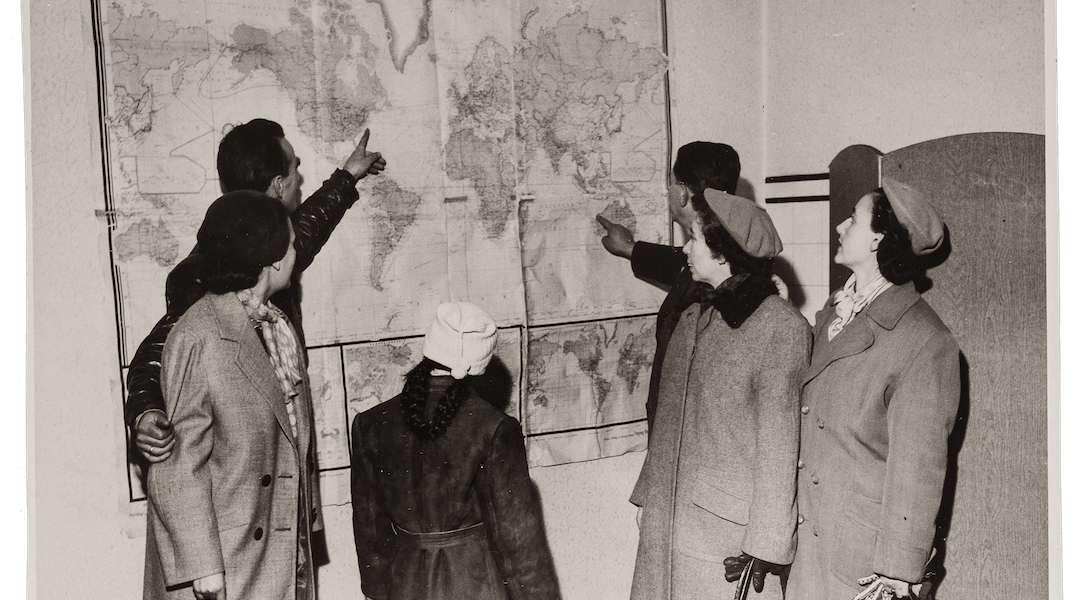Tel Aviv ‘Bubble’ Bursts But Israelis Won’t Let Rockets Run Lives

Sun and War: Even with rockets fired from Gaza peppering Israel, some flocked to the beach in Tel Aviv. Image by getty images
(JTA) — Had the shrapnel fallen a foot to the right, gas station attendant Michael Savlov would have been destroyed along with the rest of the Dor Alon gas station in southern Tel Aviv.
Savlov was with a customer in the station’s office Thursday morning when a rocket from Gaza was intercepted overhead by Israel’s Iron Dome missile defense system. The rocket exploded in the air, but shrapnel fell onto the gas station, only narrowly missing the gas tanks.
“It was like a truck hitting concrete,” Savlov, 24, recalled. “There was a boom and the ground shook like an earthquake. I didn’t expect it to hit here. We’re lucky everything is OK. Had it fallen to the right it would have blown up everything.”
Long insulated from Gaza’s rockets due to distance, Tel Aviv has found itself a target in the conflict between Israel and Hamas that escalated Tuesday into a full-blown IDF campaign, dubbed Operation Protective Edge.
Hamas missiles first reached Tel Aviv during the group’s 2012 conflict with Israel, but a larger stockpile of long-range missiles this time around has allowed it and Islamic Jihad, another terrorist group, to shoot seven missiles at Tel Aviv so far during this confrontation. The warning sirens that precede missile attacks, a seminal sign of the conflict in the south, have become a daily experience in Israel’s largest metropolitan area.
The barrage has gone some way toward popping the so-called bubble that separates Tel Aviv from the rest of Israel, sending residents into shelters and stairwells for protection when warning sirens ring out. Israel’s Iron Dome missile defense system so far has prevented any deaths from the rocket fire, enabling residents largely to go on with their lives despite the threat of attack.
“Here it’s like there’s a siren and within five minutes people return to their routines,” said Ilan Lugasi, 48, while sitting at a crowded outdoor cafe Friday morning in the city center. “It’s better that way.”
All the same, Lugasi cautioned, “some people trust Iron Dome too much.” While residents have traded stories of waking up to a siren and rushing to the stairwell in pajamas, some Tel Avivis haven’t let the bomb threats interrupt their daily routines.
At the city’s open-air Carmel Market, a crowded, chaotic avenue, customers bustled Friday amid the produce stands and cheese merchants. Fruit sellers yelling prices over each other in the unending quest to draw customers quieted down only when late-morning bomb sirens — distant at first — began to grow louder, closer.
In a dry-goods store, a still voice came on the radio, interrupting a pop song: “Sirens in Bat Yam and Holon. Sirens in Shoham, Ben Gurion Airport.”
As the announcer mentioned other neighboring cities, alerts from afar, blaring faintly, could be heard. “Where are the missiles?” a young man asked.
“Wait for the boom,” a cashier said.
Then the blaring was up close, pulsing. The radio broadcaster made it official: “Sirens in Tel Aviv-Yafo.”
But after a moment’s pause, people kept shopping and pushing their way through the market. Explosions could be heard a few seconds later, multiple booms signaling a successful Israeli interception, but by then it was almost an afterthought.
“They shoot the missiles, and Iron Dome intercepts it,” said Moshe Dali-Levi, a produce seller, smiling and shrugging.
Another loud noise drowned him out from behind: “Five shekels for a kilogram!” one seller yelled. “Bourekas! Bourekas!” screamed another.
“It’s not good at all,” Chani Levi, who manages a pet store near the market, said. “The missiles could fall on them. They stand, laugh, look at the sky. It scares me. There’s no fear.”
At a nearby barbershop, Roni, 48, scoffed at the idea of hiding during a siren. Many older buildings don’t have bomb shelters, forcing Tel Avivis to improvise on a moment’s notice.
“We have nowhere to run,” laughed Roni, who declined to give his last name. “What do you want us to do? Is there a shelter? There’s no shelter here.”
At a nearby clothing store belonging to the popular Castro chain, employee Ayala Onunu, 20, said people are more cautious in her home city of Rishon Le-Zion, which also has had sirens.
“People here are complacent,” she said of Tel Aviv. “In Rishon, they’re scared, they feel it’s a war. Here, people deny reality.”
The southern Tel Aviv gas station hit by shrapnel resumed operations Thursday shortly after police and army personnel came to clean up the scene. Two hours later, Savlov was helping a customer fill up his car next to the police tape demarcating where the shrapnel landed.
Savlov said he wasn’t scared, and that his life would continue on as normal. But he did learn one lesson from the ordeal, he noted.
“I think if there’s a siren,” he said, “we should go to the shelter.”















